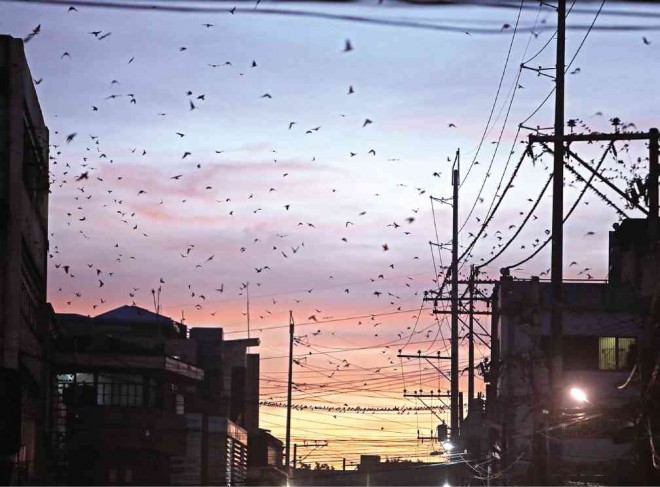
BIRDS hang out on buildings and electric cables in an area on Colon Street. LITO TECSON/CEBU DAILY NEWS
CEBU CITY, Philippines—Motorists and passersby would often stop and look up upon reaching the corner of Borromeo and Colon streets in downtown Cebu City.
The objects of attention are the thousands of birds, locally known as sayaw, perched atop old buildings and electric cables.
According to street vendors in the area, the number of birds hanging out in the area had grown in recent days.
“A lot of people would stop and look up. Others would get pissed off because they would often step on bird droppings. If they were not lucky, they would have bird droppings on their head or clothes,” said street vendor Manuel Cuevas.
He said he noticed that the birds would start arriving at 5 p.m. He said he didn’t know what time the birds left.
Traffic enforcer Jean Paolo Neri said the presence of the birds would often cause minor accidents as drivers and pedestrians could not stop themselves from looking up.
“We want to remind motorists to focus on driving,” Neri said. “Pedestrians should also be mindful while crossing the streets and ignore the birds so they can cross safely,” he added.
Ariel Rica, chief of the regional office of the Wildlife Management Division of the Department of Environment and Natural Resources, said there were between 4,000 and 5,000 birds when she inspected Colon and Borromeo streets recently.
He said sayaw birds were abundant in Cebu and would feed on insects. They hang out in places in search of food, he added.
And the downtown area may have the kind of food that the birds want.
Rica said the old buildings might have termites, one of the insects that sayaw birds fed on.
Their presence is also an indication that there must be a lot of garbage in the area, where insects gather and attract the birds, Rica said.
“The advantage of this is that the birds control the population of insects in the area,” he said.
The disadvantage? “These birds may carry bacteria that can cause various illnesses,” he added.
He said another reason the birds flock to the city was the destruction of their natural habitat.
Rica said the presence of the birds should not be taken as an omen.
“No, the old belief that this is a sign of a calamity, or a bad event to happen in the future, is not true,” Rica said.
“This is the birds’ nature. They look for food and they go to places where they can survive,” he said.